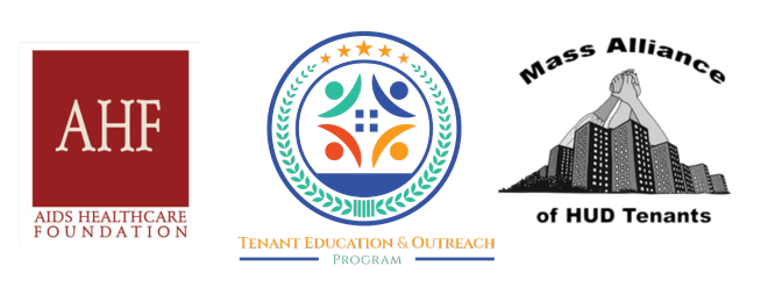What Activities Can Groups Perform with TEO Funds?
Organizations that are selected to receive sub-awards will choose priorities and plan TEO activities based on the specific needs of the PBRA properties served. TEO activities will emphasize the long-term engagement of tenants to improve property conditions and enhance the overall quality of life at the property
Eligible uses of TEO sub-awards include funding for:
- Board members and organizers to attend training events;
- Staff Resident Outreach Coordinators to promote active participation;
- Connecting tenants with resources; and
- Resident service stipends for tenant organization board members and
others who work on TEO activities for the tenant organization.
Other eligible sub-recipient costs include:
limited tenant organization overhead costs, such as meeting space rental;
meeting flyers, printing costs, translation, and interpretation services;
reasonable food and daycare costs for meetings
cell phone with a digital camera for photographing property issues; and
a laptop or tablet with internet service/data plan for organizing activities.
To receive a stipend, the tenant performing the service must enter into a written agreement with the tenant organization or CBO that specifies the amount of stipend, the period of time during which it will be received, the work or service that the tenant must do in order to receive it, and the terms of repayment to the tenant organization if the agreed upon work is not performed. Each stipend recipient must submit the number of hours worked and the work performed each month.
A Resident Board Stipend is not a salary and does not come with fringe benefits. Stipends are compensation for residents who devote particular time and effort over a specified period of time. General participation in the tenant organization, such as attending general meetings, responding to surveys or voting in general tenant organization elections does not constitute work for the tenant organization.
Lobbying activities are strictly prohibited. TEO funding may not be used for direct or indirect legislative lobbying activities, including ‘grassroots’ lobbying, for or against legislation at the local, state or federal levels. TEO funds must not be used to contribute to a political party, campaign, political action committee, or other organization established for the purpose of influencing the outcomes of legislation, referenda, initiatives or elections. (Administrative advocacy on policy or enforcement matters is not prohibited legislative lobbying under 2 CFR Part 200 or Section 514 (f)(3)(c ) of the Multifamily Assisted Housing Reform and Affordability Act (MAHRAA)).
TEO funds must not be used for these ineligible activities:
Recreational activities;
Landlord/tenant legal services for individual assisted households on matters such as evictions or termination of rental assistance;
Activities funded from other sources, including resident participation funds provided at properties that have converted through the Rental Assistance Demonstration (RAD) program; and
Pre-award costs and activities completed prior to receiving a sub-award.
Note: this would include getting approval signatures from tenants
What Activities Are Not Eligible Uses for TEO Funding?
Specific eligible activities may include, but are not limited to:
publicizing and conducting regular tenant meetings;
documenting any persistent, unresolved physical condition concerns and
owners’ responses to these complaints;
salary and benefits for a FTE Resident Outreach Coordinator;
addressing basic questions about tenant rights and responsibilities from
residents;
developing effective working relationships with owners/property managers;
developing effective working relationships with HUD, Real Estate
AssessmentCenter (REAC), Performance Based Contract Administrators
(PBCA), and state and local oversight agencies regarding administrative
policy and code enforcement;
assuring that any board elections are held using a democratic process;
organizing outreach and community meetings or events;
establishing resident committees/groups to address specific quality of life
issues, which may or may not be related to owner compliance with HUD
agreements;
preparing and submitting required data, reports and documentation to MAHT
and AHF; and participating in training on topics that build organizational and
tenant leadership capacity. Resident Outreach Coordinators. If you are
proposing to hire one or more staff Resident Outreach Coordinators with your
TEO sub-award, you must enter into a written employment agreement with the
Resident Outreach Coordinator(s) that outlines their salary, benefits and other
conditions of employment.
Resident Board Stipends. TEO funding can be used for limited resident
Volunteer stipends for a PBRA household member on the lease to perform
specific tasks (such as preparing expense reports, supervising volunteer teams,
providing childcare or eldercare during meetings/activities, or
organizing/leading trainings) per a written agreement with the tenant
organization. Regular and recurring stipends at a suggested rate of $15 per
hour for specified work or service cannot exceed $200/month, and must be
reported as income.
